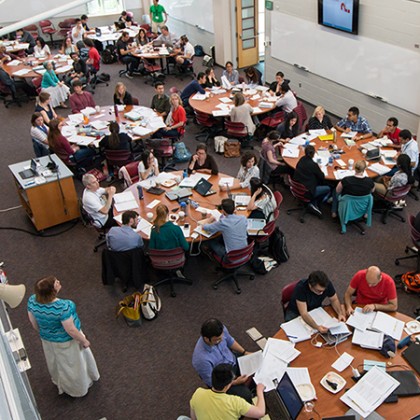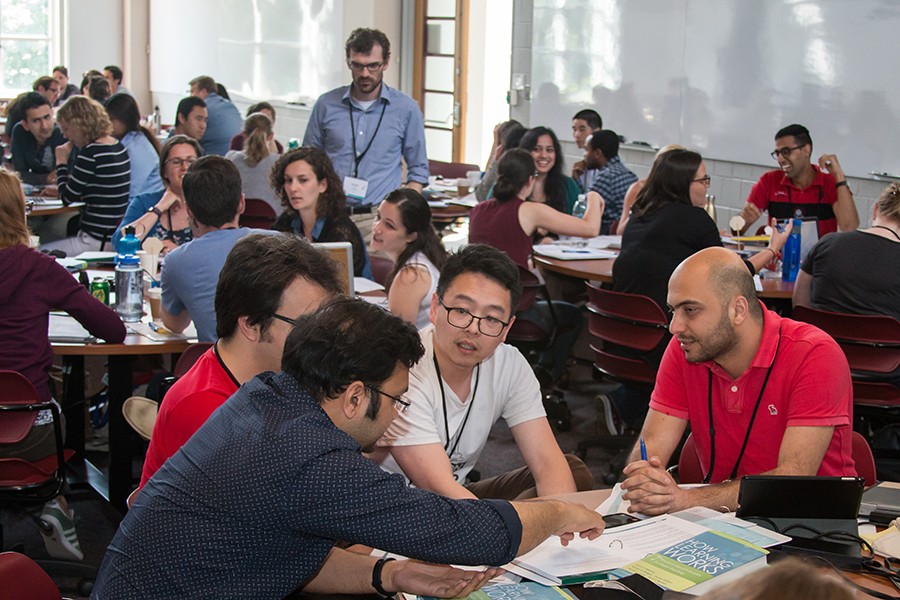For a professor, there's a lot more that goes into the first day of class than just going over the syllabus. Students will be gauging your personality, for instance, and how interesting your course may be.
"You can afford to do some selling," said Jason Eisner, a computer science professor at Johns Hopkins University, to a room full of teachers-in-training last week. "You don't have to be ashamed to be an evangelist for what you're teaching."
The group of 71 grad students and post-docs listening to Eisner's tips were in their final day of the Teaching Institute, an immersive professional development workshop at Johns Hopkins.
In the popular three-day program, run by the Center for Educational Resources, current JHU faculty members provide tools and training to get their future colleagues ready for careers that will likely balance teaching and research responsibilities.

Image caption: About 150 post-docs and grad students took part in the Teaching Institute program over the past two weeks
Image credit: Center for Educational Resources
For the session on how to prep for the first day of class, biology professor Richard Shingles joined Eisner to share wisdom from his own experience. Shingles said he often gives a "pre-test" the first day, to judge students' baseline knowledge of the course material. He also suggested giving an assignment straight off the bat, so students get a sense of how they'll juggle their workload.
David Cereceda, a post-doctoral fellow who enrolled in the Teaching Institute, said the program gives researchers a rare chance to focus exclusively on teaching methods.
"We're a top university for pursuing excellence in research, but we also have an opportunity to pursue excellence in teaching," said Cerceda, a researcher with the Hopkins Extreme Materials Institute who's heading next for a tenure-track position at Villanova.
For many participants, the Teaching Institute is their most concentrated experience for learning skills such as how to design and teach a course, how to create a syllabus, and "active" learning techniques. In addition to hearing the advice from current faculty, participants create instructional materials of their own and share ideas in teams.
Many are finding the program helps them compete on the job market, according to Mike Reese, director of the Center for Educational Resources.
"You can show you're doing good research, but you're also trained to teach. The two aren't unrelated," said Reese, pointing to scientific research suggesting that teaching experience improves core research skills for graduate students.
Due to long waiting lists in the past, organizers added a second workshop this year on the East Baltimore campus, in addition to the original Homewood location. In total, about 150 post-docs and grad students took part in the programs over the past two weeks. The majority were from Johns Hopkins, with several continuing to faculty positions at the university, said Reese, but the program also reserves seats for students from peer institutions within Center for the Integration of Research, Teaching, and Learning network.
"Previous CIRTL participants are telling their peers to come to Johns Hopkins for this training," Reese said.
For many, the institute is the second phase of the broader Teaching Academy, a certificate program that provides training, collaboration, and hands-on teaching experience for interested PhD students or post-doctoral fellows at Johns Hopkins. Most complete the flexible program over the course of two or three semesters, while maintaining their focus on research responsibilities.
"It's one of very few times and spaces at Hopkins that we have to really focus on teaching and professional development," said Lauren Reynolds, a recent PhD who went through the academy last year and has since assisted in running it.
Reynolds said the Teaching Academy helped her become a competitive applicant for faculty positions, "being able to speak as coherently about teaching as I did about my research." In the fall, she'll be a visiting professor of Spanish at the University of Mississippi.
For Cereceda, the three-day Teaching Institute was an opportunity he pursued last week as a bonus, even though he'd already completed the Teaching Academy.
"I think what they're doing here is something very valuable," he said. "All of us can learn how to teach better."
Posted in University News, Student Life
Tagged faculty, teaching as research, teachers, center for educational resources










